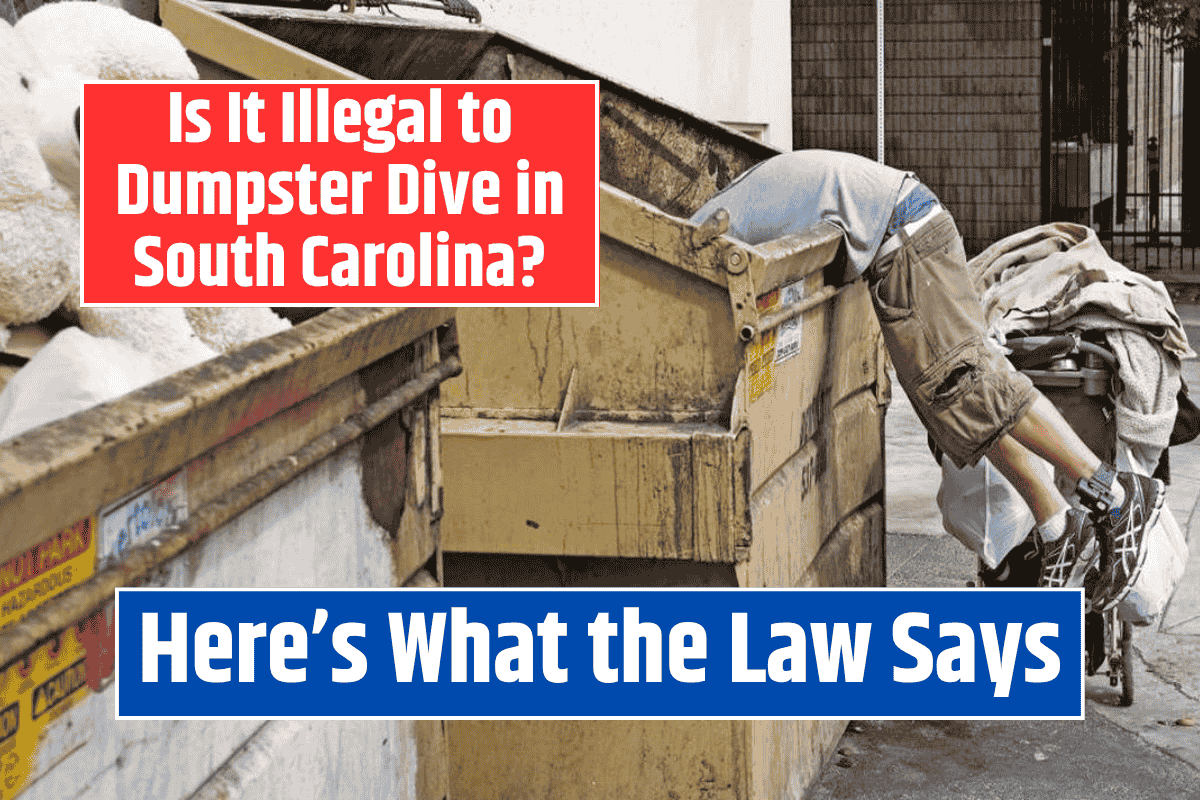Dumpster diving—searching through commercial or residential waste for usable items—is growing in popularity due to environmental concerns, food recovery efforts, and even resale opportunities. But is it legal to do so in South Carolina?
The answer is mostly yes, but there are a few legal and safety rules to keep in mind before diving into that dumpster.
This article breaks down South Carolina’s laws on dumpster diving in simple language, including what’s allowed, what could get you into trouble, and how to stay on the right side of the law.
Dumpster Diving: What the Law Says
In general, dumpster diving is not illegal in South Carolina. The U.S. Supreme Court has ruled that items left out for collection—such as trash placed on the curb or in open dumpsters—are considered abandoned, and therefore no longer private property. That means once something is thrown away, it’s usually fair game.
However, this doesn’t mean you can go anywhere and start digging through trash without any restrictions.
When Dumpster Diving Becomes Illegal
Even though the act of dumpster diving itself isn’t a crime, how and where you do it can lead to legal issues. Here’s what to watch out for:
1. Trespassing
Most dumpsters are located on private property—behind stores, within apartment complexes, or inside fenced areas. Entering private land to access a dumpster without permission can lead to a trespassing charge. This is especially true if there are:
“No Trespassing” signs
Locked gates or barriers
Security patrols or surveillance cameras
Even if a dumpster is visible from the street, crossing onto private property to reach it may still count as trespassing in South Carolina.
2. Local Ordinances
Some cities or counties in South Carolina may have specific rules against dumpster diving or scavenging. For example, certain areas might prohibit going through residential trash or rummaging behind businesses after hours. These rules vary widely, so it’s best to check with the local city or county code enforcement before diving.
Some cities may require a permit, while others might allow it as long as it doesn’t become a nuisance.
3. Creating a Public Nuisance
Leaving a mess behind, blocking sidewalks, or attracting attention with loud or disruptive behavior can lead to complaints or fines. Law enforcement might step in if someone reports you for disturbing the peace or creating a mess.
Always be respectful: clean up after yourself and avoid causing damage to property or leaving debris behind.
What Should You Do If Approached by Police or Property Owners?
If someone asks you to leave—whether it’s the police or a store manager—the best move is to stay calm and comply. Arguing could escalate the situation. Most experienced dumpster divers recommend:
Politely leaving the area
Not trying to justify your actions on the spot
Coming back later, or asking for permission next time
In some cases, especially with small businesses, asking for permission in advance may even open doors to regular, hassle-free diving.
Practical Tips for Dumpster Diving Legally in SC
Avoid locked or fenced areas—these are clear signs of private property.
Go during daylight hours—to avoid suspicion and stay safe.
Don’t force open locks or gates—this can lead to criminal charges.
Check city and county websites for specific ordinances.
Be respectful and clean up—good manners go a long way.
Dumpster diving in South Carolina is generally legal, but it comes with limits. The main legal risks come from trespassing and violating local laws, not from the act of retrieving items itself.
Always pay attention to signs, property boundaries, and local ordinances. If you’re ever unsure about the rules in a particular area, check with local law enforcement or city hall.
When done responsibly, dumpster diving can be a legal and eco-friendly way to reduce waste and save money. Just be smart, respectful, and aware of your surroundings.
[1] https://freelawchat.ai/property-law/2071980/dumpster-diving-legal-considerations.html
[2] https://www.reddit.com/r/DumpsterDiving/comments/7uap53/asked_local_sc_pd_the_legal_status_of_dumpster/
[3] https://www.findlaw.com/injury/torts-and-personal-injuries/dumpster-diving.html
[4] https://www.legalmatch.com/law-library/article/is-dumpster-diving-illegal.html












